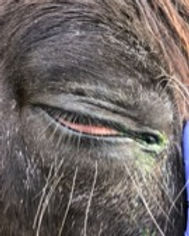Eye Care
Eye issues in horses
Does your horse have a swollen or weeping eye?
These are signs of discomfort and pain and we recommend any owner noticing these symptoms to contact us ASAP.
Eyes can deteriorate very quickly, and small injuries can result in blindness if left untreated.
If you are unsure whether your horse needs to be seen, contact us and we will make an appointment to visit and advise you on the best teatment.

What are veterinarians able to do to examine your horse’s eye?
First our veterinarian will determine whether the horse will require sedation for proper examining. Usually this is the case but we have a few outstanding patients! This is a light, standing sedation. Depending on the suspected injury to the eye your veterinarian may need to perform a minor nerve block to stop the upper eyelid blinking for a short amount of time, or will apply some local anaesthetic directly to the eyeball to reduce the pain of examination.
Eye cases will often need intensive treatment by willing owners. Alternatively they can come to our hospital if unable to be treated at home.
For any suspected ulcers a fluorescein stain will be applied to the eye, this helps the veterinarian to establish which layer of the eye has been breached (there are 5 layers!). This will allow the veterinarian to decide how best to treat the injury. Depending on what is found there are various other tests that your veterinarian may perform.

Ulcer before fluorescein stain

Ulcer after fluorescein stain
Drugs that we may need to prescribe to your horse:
Antibiotics or antifungals: Most ulcers are treated as infectious and antibiotic creams are prescribed as a precautionary measure. For persistent or severe ulcers or stromal abscesses we will sometimes need to take a sample to send to the lab for a fungal/bacterial culture to ensure the eye is treated effectively.
Pain relief: Most of us have experienced a sore eye and know how painful it can be. We prescribe all eye cases with non-steroidal anti-inflammatories and atropine. Atropine works to dilate the pupil, facilitate with drainage of the eye and reduce ciliary spasm, which is very important to help reduce pain and heal the ulcer.

Eye with constricted pupil
Some common things that go wrong with eyes:
Foreign bodies or trauma causing ulceration
Most often when your horse has banged his eye, you will see a large swelling of the eyelid, and they will want to hold it shut (blepharospasm). The eye will likely be weeping (epiphora). With these cases we recommend ringing us as soon as possible so that we can assess any damage that has been done. Ulcers that are treated correctly straight away generally have a good prognosis and will require less time for treatment.

Swollen eye
Stromal abscess
Sometimes the outside surface of an ulcer will heal and an abscess will form underneath in a layer called the ‘stroma’. The problem with this is that there is now no drainage from the lesion. A stromal abscess left untreated will often result in blindness. These will require repeated visits from your veterinarian to debride the outer surface of the lesion to facilitate antibiotic/antifungal treatment and drainage.

Cancer of the eye
The three most common equine neoplasms of the eyelid are squamous cell carcinoma (SCC), sarcoid and melanoma. Horses that lack pigmentation to their eyelids are most susceptible, including appaloosas and paint bred horses. Treatment is more successful when caught early. Owners of susceptible horses should regularly monitor their horses eyes and look for any abnormalities of the third eyelid (a good example seen in this photo below). Treatment options include: surgical removal, cryotherapy and chemotherapy.

